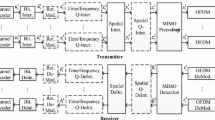Abstract
In this paper, the modulation diversity is used to improve the performance of M-PSK modulation over fading channels. Modulation diversity can be achieved by rotating the signal constellation and using component interleaving. We derive symbol error probability expressions for rotated uncoded M-PSK over Ricean fading channels and obtain optimal rotation angles for M-PSK (M = 2, 4, 8). We show that rotated signal constellations with component interleaving improve the performance of M-PSK significantly as compared to the unrotated one over Rayleigh and Ricean fading channels. For example, when the ratio of the direct path power to the multipath signal power, K is 0 and 10, 8 and 1.5 dB gains are obtained, respectively, at a symbol error probability of 10−3 for 8PSK modulation. We also show that as K gets larger, the gain obtained by the rotation rapidly decreases. We develop a new asymmetric 8PSK signal constellation obtained from two QPSK signal constellations that are optimally rotated by different angles. This asymmetric 8PSK and also the rotated 8PSK signal constellation together with component interleaving are applied to four-state trellis-coded schemes. Simulation results show that these new schemes provide good performance improvements over the original TCM schemes and previous relevant works over Rayleigh and Ricean fading channels.
Similar content being viewed by others
References
Taricco G., Viterbo E. (1996). Performance of component interleaved signal sets for fading channels. IEE Electronics Letters 32(13): 1170–1172
Boullé, K., & Belfiore, J. C. (1992). Modulation schemes designed for the Rayleigh channel. In Proceedings of the CISS’92, Princeton, pp. 288–293.
Giraud X., Belfiore J.C. (1996). Constellations matched to the Rayleigh fading channel. IEEE Transaction on Information Theory 42(1): 106–115
Boutros J., Viterbo E., Rastello C., Belfiore J.C. (1996). Good lattice constellations for both Rayleigh fading and Gaussian channels. IEEE Transactions on Information Theory 42(2): 502–518
Giraud X., Boutillon E., Belfiore J.C. (1997). Algebraic tools to build modulation schemes for fading channels. IEEE Transactions on Information Theory 43(3): 938–952
Slimane S.B. (1998). An improved PSK scheme for fading channels. IEEE Transactions on Vehicular Technology 47(2): 703–710
Subramaniam L.V., Rajan B.S., Bahl R. (2000). Performance of 4- and 8-state TCM schemes with asymmetric 8-PSK in fading channels. IEEE Transactions on Vehicular Technology 49(1): 211–219
Wilson, S. G., & Leung, Y. S. (1987). Trellis-coded phase modulation on Rayleigh channels. In Proceedings of the ICC’87 conf. rec., Seattle, WA, pp. 21.3.1–21.3.5.
Jamali S.H., Le-Ngoc T. (1991). A new 4-state 8PSK TCM scheme for fast fading, shadowed mobile radio channels. IEEE Transactions on Vehicular Technology 40(1): 216–222
Proakis J.G. (2001). Digital communications. NewYork, McGraw-Hill
Simon M.K., Alouini M.S. (2000). Digital communications over generalized fading channels: A unified approach to performance analysis. New York, Wiley
Abramowitz M., Stegun I.A. (1970). Handbook of mathematical functions with formulas, graphs and mathematical tables (9th ed). New York, Dover
Özyurt, S. (2005). Performance of phase shift keying modulation with rotated signal constellation over fading channels. M.Sc. thesis, Electronics Engineering Department, Gebze Institute of Technology, Turkey.
Özyurt, S., Kucur, O., & Altunbaş, I. (2005). Performance of rotated phase shift keying modulation over Ricean fading channels. In Proceedings of the IEEE ISWCS’05, Siena, Italy.
Jeličić B.D., Roy S. (1994). Design of trellis coded QAM for flat fading and AWGN channels. IEEE Transactions on Vehicular Technology 44(1): 192–201
Author information
Authors and Affiliations
Corresponding author
Rights and permissions
About this article
Cite this article
Özyurt, S., Kucur, O. & Altunbaş, İ. Error Performance of Rotated Phase Shift Keying Modulation over Fading Channels. Wireless Pers Commun 43, 1453–1463 (2007). https://doi.org/10.1007/s11277-007-9319-7
Received:
Accepted:
Published:
Issue Date:
DOI: https://doi.org/10.1007/s11277-007-9319-7




